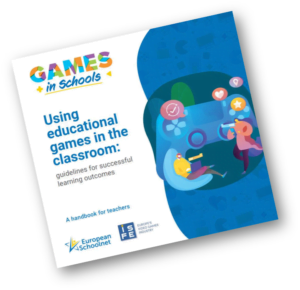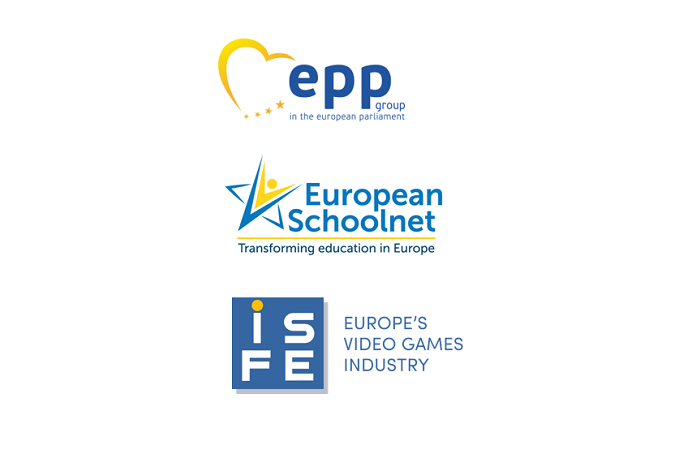
Experts weigh in on the benefits of learning by playing
On the eve of the publication of the EU’s updated Digital Education Action Plan, Video Games Europe and European Schoolnet hosted the virtual Games in Schools event. “Learning by Playing” brought together EU policymakers, educational experts, and the video games industry to discuss the challenges and opportunities presented by the use of video games as pedagogical support in the classroom. Well over 4,000 teachers across Europe took part in the latest Games in Schools Massive Open Online Course (MOOC).
Learning by Playing speakers and panelists:
- Sabine Verheyen – Chair of the European Parliament Committee on Culture and Education.
- Antoaneta Angelova-Krasteva – Director for Innovation, International Cooperation & Sport at DG EAC, European Commission.
- Rehana Schwinninger-Ladak – Head of Unit at DG Connect, Interactive Technologies, Digital for Culture and Education at the European Commission.
- Felix Gyllenstig Serrao – Game-based learning expert and Project Manager on Education Teaching Materials for Göteborg, Sweden.
- Genevieve Johnson – Senior Instructional Designer, Roblox.
- Ollie Bray – Games in Schools course coordinator and Global Director of Connecting Play and Education at the Lego Foundation.
- Shahneila Saeed, moderator, Head of Education at Ukie, the UK trade body for video games.
Hosted on 29 September, the event saw the launch of the latest Handbook for teachers, an invaluable resource for teachers consisting of peer-reviewed lesson plans and a list of suitable video games for the classroom. There was a practical and informative discussion between expert speakers on the urgent need to digitalise education in Europe, along with concrete calls for action to help maximise the huge potential the use of video games in the classroom represents for positive learning experiences and relevant 21st-century skill-enhancing education.
to help maximise the huge potential the use of video games in the classroom represents for positive learning experiences and relevant 21st-century skill-enhancing education.
Key findings
The Coronavirus pandemic made pupils, students, teachers, and parents totally reliant on digital skills and resources overnight. It brought into sharp focus the need for industry, educational establishments, and policymakers to work together urgently to bridge the gaps in both knowledge and access to technology.
Video games, used appropriately to complement the curriculum taught by teachers, can improve behavior, make learning more appealing and engaging, improve skills such as collaboration, imagination, attention, problem-solving and critical thinking, increase digital skills and civility and encourage children into technology training and careers. Bringing teachers on-board and giving them adequate training and resources is key – if teachers are not enthused, trained, and given the resources they need, progress in digital education will be slow.
We know from a European Schoolnet survey of a previous iteration of Games in Schools, that motivation to learn when using video games in the classroom is close to 90%. Learning by playing has great potential to increase student engagement and learning outcomes. Modern technology can support students even further by allowing them to express themselves digitally. Video Games Europe and European Schoolnet will continue to work together to further the Digital Education Action Plan’s goal of universal digital literacy, supporting teachers to use the exciting and appealing medium of video games to help make education in Europe fit for the digital age.
Main challenges identified
- Teachers are absolutely key to integrate digital knowledge into education. If they are not given the skills and tools, progress will not be made.
- Issues of inequality are key. Not all families have the resources to equip their children with the necessary technology at home. This was particularly noticeable throughout the Coronavirus lockdowns which meant that learning happened online and at home.
- Lack of confidence amongst teachers to use video games and digital content.
Opportunities
- Video games can be enablers to level the playing field in education.
- Engage with the European Commission on projects to encourage girls and young women into STEM.
- Support the Digital Education Action Plan’s goal to strengthen Europe’s digital competence.
Call to action
- A forum for teachers to share tips and information on video games in the classroom
- An EU-wide repository for teachers to find digital education resources.
- Support the European Commission’s mission to set up a multi-stakeholder group to develop common guidelines for teachers and educational staff to foster digital literacy and tackle disinformation.


